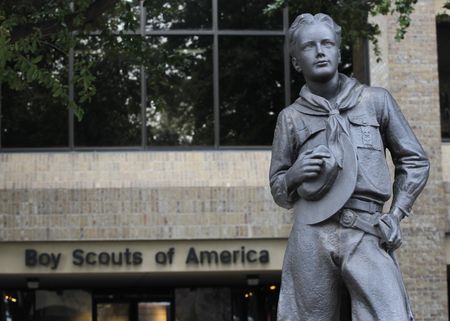 1
1 1
1
By Dietrich Knauth
(Reuters) -The Boys Scouts of America said on Wednesday it had emerged from bankruptcy after battling back appeals over its $2.46 billion settlement of decades of sexual abuse claims.
The Boy Scouts’ three-year Chapter 11 bankruptcy case resulted in the largest sexual abuse settlement fund in U.S. history and resolves claims by more than 80,000 men who say they were abused as children by troop leaders, according to the organization.
Boy Scouts of America CEO Roger Mosby in a statement thanked the men who had spoken out about being abused, saying their advocacy would protect current and future Scouts from the kinds of predation that they suffered in the past.
“We have failed you and we are truly, deeply sorry,” Mosby said in an open letter to abuse victims. “Survivors, your bravery has moved us beyond words.”
Adam Slater, an attorney representing abuse victims, said that the settlement would give “some tangible measure of justice” to men who had suffered in silence for years.
The Boy Scouts settlement was supported by 86% of abuse claimants and the Boy Scouts’ two largest insurers, which funded a large part of the settlement.
The Boy Scouts organization was able to emerge from bankruptcy after the Philadephia-based 3rd U.S. Circuit Court of Appeals on Wednesday declined to put the settlement on hold while appeals by another group of insurers and a minority of abuse claimants proceed. A U.S. district court had previously rejected their claims.
Money for the settlement comes from the Boy Scouts, local councils, insurers and organizations that have chartered Scouting units and activities, including churches.
The settlement may grow larger if additional insurers and chartered organizations agree to contribute to the fund. The Boy Scouts organization has contributed additional insurance rights to the settlement fund, which may be worth as much $4 billion, according to court documents.
The amount of money individual abuse survivors stand to gain from the bankruptcy plan ranges from $3,500 to $2.7 million, depending on the severity of the alleged abuse, where and when it occurred, and other factors.
The organization had filed for bankruptcy in February 2020 after several U.S. states enacted laws allowing accusers to sue over decades-old abuse allegations. The 113-year old organization, already facing declining membership, had previously said it might not survive without resolving those lawsuits in bankruptcy.
(Reporting by Dietrich Knauth in New York; Editing by Alexia Garamfalvi and David Gregorio)